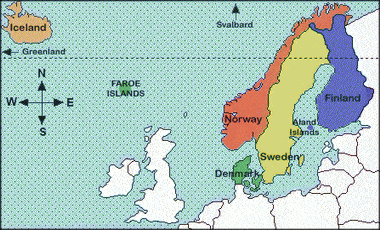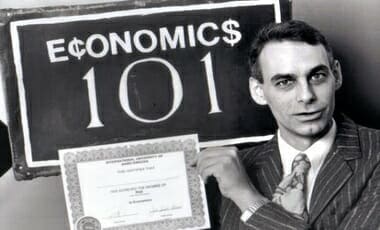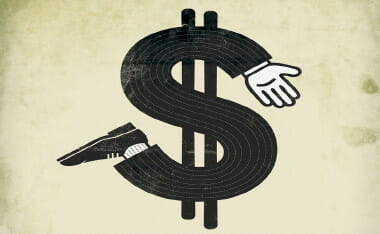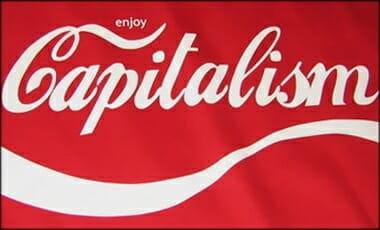WATCH the documentary on Amazon Prime: “Sweden: Lessons for America?” (1-hour)
(Jump to the challenges directed at me dealing with America protecting these smaller countries)
The Myth
Gay Patriot introduces us to the myth often put forward by the left. This post by Gay Patriot will add to the video by Bill Whittle that follows it:
One of the myths Progressive Leftists elevate to “fact” by constantly repeating it to each other is the idea that Scandinavian countries are the closest on Earth fulfillment to their socialist dream utopia. ~ Gay patriot
Kyle Smith, writing in the NY Post, digs a little deeper and discovers that, like almost everything Progressive leftists believe, the Myth of Scandinavian Utopia really is as much a myth as the college rape epidemic, the genius of Barack Obama, or the popularity of gun control.
Visitors say Danes are joyless to be around. Denmark suffers from high rates of alcoholism. In its use of antidepressants it ranks fourth in the world. (Its fellow Nordics the Icelanders are in front by a wide margin.) Some 5 percent of Danish men have had sex with an animal. Denmark’s productivity is in decline, its workers put in only 28 hours a week, and everybody you meet seems to have a government job. Oh, and as The Telegraph put it, it’s “the cancer capital of the world.”
So how happy can these drunk, depressed, lazy, tumor-ridden, pig-bonking bureaucrats really be?
I think my favorite paragraph is where he cites the Scandinavian Social Contract as the “Ten Commandments of Buzzkill.”
“You shall not believe that you are someone,” goes one. “You shall not believe that you are as good as we are,” is another. Others included “You shall not believe that you are going to amount to anything,” “You shall not believe that you are more important than we are” and “You shall not laugh at us.”
They read like the 10 Commandments of Progressive Leftism…
Economics 101
In an excellent Bloomberg article entitled, “Booming Sweden’s Free-Market Solution,” the myth is dismantled in toto by Anders Aslund. Here is a snippet:
…From 1970 until 1989, taxes rose exorbitantly, killing private initiative, while entitlements became excessive. Laws were often altered and became unpredictable. As a consequence, Sweden endured two decades of low growth. In 1991-93, the country suffered a severe crash in real estate and banking that reduced GDP by 6 percent. Public spending had surged to 71.7 percent of GDP in 1993, and the budget deficit reached 11 percent of GDP.
TURNING POINT
The combination of the crisis and the non-socialist government under Carl Bildt from 1991 to 1994 broke the trend and turned the country around. In 1994, the Social Democrats returned to power and stayed until 2006. Instead of revoking the changes, they completed the fiscal tightening. In 2006, a non-socialist government returned, and Finance Minister Anders Borg, with his trademark ponytail and earring, has led further reforms. Sweden successfully weathered the global financial crisis that started in 2008, and the Financial Times named Borg Europe’s best finance minister last year.
Before 2009, Sweden had a budget surplus, and it has one again. For the past two years, economic growth has been 4 percent on average, and the current-account surplus was 6.7 percent in 2011. The only concerns are the depressed demand for exports caused by the current euro crisis and an unemployment rate that is about 7.5 percent.
Sweden’s traditional scourge is taxes, which used to be the highest in the world. The current government has cut them every year and abolished wealth taxes. Inheritance and gift taxes are also gone. Until 1990, the maximum marginal income tax rate was 90 percent. Today, it is 56.5 percent. That is still one of the world’s highest, after Belgium’s 59.4 and there is strong public support for a cut to 50 percent.
The 26 percent tax on corporate profits may seem reasonable from an American perspective, but Swedish business leaders want to reduce it to 20 percent. Tax competition is fierce in some parts of Europe. Most East European countries, for example, have slashed corporate taxes to 15-19 percent….
Reason.org Weighs in on the “Swedish” experiment, how it got its wealth, noting how it squandered it, and how it is returning to the pre-70’s ideology:
- Sweden is a powerful example of the importance of public policy. The Nordic nation became rich between 1870 and 1970 when government was very small, but then began to stagnate as welfare state policies were implemented in the 1970s and 1980s. The CF&P Foundation video explains that Sweden is now shifting back to economic freedom in hopes of undoing the damage caused by an excessive welfare state.
And do not think for a moment that the free-market has not allowed Sweden or other Nordic nations to get back on their feet. This is is pointed out in the following “101” presentation on economics:
The Above Video Description via Reason.org:
For those of us who place more trust in free markets than state-directed economies, we must inevitably (and repeatedly) confront the skeptical interlocutor who details the “successes” of Swedish social democracy. “If state intervention into the economy is so bad, high taxes so destructive, then why is Sweden such a success?” It’s an irritatingly simple question with a incredibly complicated answer, though I do recommend pointing out, when the conversation turns to health care and secondary education, that nothing, in a state the confiscates a massive portion of your income, is “free.” But as many have pointed out, during its boom years, Sweden was a pretty free market place; from the 1970s through the 1990s—when taxes and regulation dramatically increased—the economy slowed until it spun out in the early 1990s…
[….]
…So here is my bottom line: When some American pundit, with expertise is everything, explains why some European welfare state “works,” or how everything you know is wrong about taxing income at 75 percent, do a little digging, make use of Google Translate, and don’t trust that, because Swedes and Danes tell researchers that they are happy, the United States should introduce “daddy leave” and provide subsidies to syndicalist newspapers.
The best English-language explication of the Swedish model comes from my pal Johan Norberg, who wrote this brilliant piece for The National Interest a few years back. And watch my interview with Norberg on Swedish welfare politics here and on Naomi Klein here.
The following interview is Johan Norberg, author of In Defense of Global Capitalism, sits down with reason.tv’s Michael C. Moynihan to sort out the myths of the Sweden’s welfare state, health services, tax rates, and its status as the “most successful society the world has ever known.”
- See also the Mises article about the health care system entitled: “The Market is Taking Over Sweden’s Health Care.” See also “How Laissez-Faire Made Sweden Rich.”
National Review seems like a good place to continue the theme of showing how the Nordic countries have used the free-market system to recoup what it has lost with previous regulations that crippled free-enterprise. Here is a comparison between Sweden and Venzuala that was helpful in explaining how Sweden has less regulations that us in many places (a recent phenomenon BTW):
Talk to a Bernie Sanders voter about “socialism” — and they can be very insistent about using the word — and you’ll get paeans to Sweden, which is not a socialist country but a country with large, expensive welfare state. The distinction is not trivial: There is relatively little in the way of state-run enterprise in Sweden; the Swedish government is in fact only a 60 percent partner in the postal service. The Swedish government is, alas, in the casino business, albeit in a more transparent way than American government is. On the Heritage economic-freedom rankings, Sweden isn’t that far behind the United States. It has very high taxes, but taxes are not the only burden that governments put on the economy, not necessarily even the most important, and Sweden outscores the United States on a number of important metrics: free trade, property rights, freedom from corruption, investment freedom, monetary policy, etc. The United States’ small edge in the rankings comes mainly from relatively low taxes and a much less regulated labor market.
Reason.org again weighs in on whether Sweden is the right model for the U.S. to emulate:
The Above Video Description:
To the American mind there may be nothing more quintessentially Swedish than the leggy, blond supermodel.
But there’s another Swedish model that inspires almost as much admiration—the Swedish economic model. With a generous welfare state and high living standards, Sweden seems to prove that socialism works. Much of the hope that swept Barack Obama into the White House rests on the belief that America could reach new heights under a regime of enlightened progressivism, that we could be more like the Swedes.
Not so fast, warns Stockholm University sociologist Charlotta Stern: “If an American told me that the US should be more like Sweden I would say I don’t think it’s possible.” The United States can centralize its health care system and pass other laws that mimic Sweden’s welfare state polices, says Stern, but it’s impossible to replicate a culture that allows those policies to operate about as smoothly as possible. Swedish bureaucracies inspire trust, but their American counterparts (DMV, TSA, IRS) inspire punch lines, if not outrage.
But America could emulate some of the Swedish policies that don’t require extensive bureaucracies. Take school vouchers. Teachers unions in America regard the idea as free-market radicalism, but families in Sweden enjoy universal school choice. Sweden adopted its famously progressive policies during the 1970s, but after years of sluggish economic growth the land of ABBA altered its course in the 1990s, adopting a host of free-market reforms, from deregulation to tax cuts.
Although much of the disco-era welfare state remains, economist Andreas Bergh credits the free market reforms with reviving his nation’s economy. “Sweden is moving in the market economic direction,” says Bergh, “but that does not mean America should be moving in the socialist direction.”
What if the two nations continue on in different directions? Maybe some day when America is looking for a way to rejuvenate its economy, pundits will point to a different kind of Swedish model. One that increases individual choice and competition.
“Sweden—A Supermodel for America?” is produced by Daniel B. Klein, and written and produced by Ted Balaker, who also hosts. Shot by Jonathan Liberman and Henrik Devell, with additional production support by Zach Weissmueller and Sam Corcos and post production by Hawk Jensen and Austin Bragg. Special thanks to Niclas Berggren, Martin Borgs, Nils Karlson, and the Ratio Institute.
A Challenge Directed At Me
In conversation about an audio upload to my YouTube Channel of Dennis Prager discussing Bernie Sanders, I was challenged with this:
- Sweden is not a Nato member so how does the US pay for Sweden defense? Pointing at Whittle and saying “because he say they do” won’t cut it.
To which I responded with a quote from an International Business Times article:
Finland is joining military exercises with other Scandinavian countries, as well as several members of NATO, in late May, Finnish media report. The maneuvers called Arctic Challenge will span 12 days, starting May 25, and include nine countries and close to 100 planes. The drills, over Sweden and northern Norway, come amid increased tensions between Russia and its Baltic and Nordic neighbors.
Sweden and Switzerland, which like Finland are not members of NATO, are expected to join the exercise, along with NATO members Norway, the Netherlands, Britain, France, Germany and the United States. Finland plans to send 16 F-18 Hornet fighter jets, while the other countries will supply Gripen “multirole” fighters, F-16s, Eurofighters and Jet Falcons, as well as transports and tankers, Russian news agency Sputnik reported. The Norwegian armed forces said the purpose of the Arctic Challenge exercise is to “learn to coordinate efforts in complicated flight operations conducted in cooperation with NATO.”
Russia has ramped up military activity along its borders with northern Europe, causing consternation in several Baltic and Nordic countries and pre-emptive actions to head off — or prepare for — a possible military crisis. Latvia, which reported a Russian submarine near its coast in mid-March, is beefing up security on its eastern border, while Finland recently began a letter campaign notifying some 900,000 reservists of their duties in a potential crisis. Sweden also intercepted four Russian planes flying over the Baltic Sea in March with their radios off. Russian jets have been intercepted in other instances while flying in European international airspace….
I also pointed out that this promise went back to the Cold War, and was not known about till a Swedish defense think-tank/security firm uncovered the agreements in 1994. The original story’s link has been lost, but it is here on FOI’s site. FOI’s “about us” page has this:
- FOI is one of Europe’s leading research institutes in the areas of defence and security. We have 1,000 highly skilled employees with various backgrounds. At FOI, you will find everything from physicists, chemists, engineers, social scientists, mathematicians and philosophers to lawyers, economists and IT technicians…. The Armed Forces and the Swedish Defence Material Administration are our main customers. However, we also accept assignments from civil authorities and industry. Our clients from the defence sector place very high demands on advanced research, which also benefits other customers.
Here is the info from the old article via WIKI:
Initially after the end of World War II, Sweden quietly pursued an aggressive independent nuclear weapons program involving plutonium production and nuclear secrets acquisition from all nuclear powers, until the 1960s, when it was abandoned as cost-prohibitive. During the Cold War Sweden appeared to maintain a dual approach to thermonuclear weapons. Publicly, the strict neutrality policy was forcefully maintained, but unofficially strong ties were purportedly kept with the U.S. It was hoped that the U.S. would use conventional and nuclear weapons to strike at Soviet staging areas in the occupied Baltic states in case of a Soviet attack on Sweden. Over time and due to the official neutrality policy, fewer and fewer Swedish military officials were aware of the military cooperation with the west, making such cooperation in the event of war increasingly difficult. At the same time Swedish defensive planning was completely based on help from abroad in the event of war. Later research has shown that every publicly available war-game training, included the scenario that Sweden was under attack from the Soviets, and would rely on NATO forces for defence. The fact that it was not permissible to mention this aloud eventually led to the Swedish armed forces becoming highly misbalanced. For example, a strong ability to defend against an amphibious invasion was maintained, while an ability to strike at inland staging areas was almost completely absent.
In the early 1960s U.S. nuclear submarines armed with mid-range nuclear missiles of type Polaris A-1 were deployed outside the Swedish west coast. Range and safety considerations made this a good area from which to launch a retaliatory nuclear strike on Moscow. The submarines had to be very close to the Swedish coast to hit their intended targets though. As a consequence of this, in 1960, the same year that the submarines were first deployed, the U.S. provided Sweden with a military security guarantee. The U.S. promised to provide military force in aid of Sweden in case of Soviet aggression. This guarantee was kept from the Swedish public until 1994, when a Swedish research commission found evidence for it. As part of the military cooperation the U.S. provided much help in the development of the Saab 37 Viggen, as a strong Swedish air force was seen as necessary to keep Soviet anti-submarine aircraft from operating in the missile launch area. In return Swedish scientists at the Royal Institute of Technology made considerable contributions to enhancing the targeting performance of the Polaris missiles.
Some More Discussion
In this first back-and-forth, I noted some of the above and got this response:
- Seems Sweden is searching for the viable balance of Capitalism and Socialism. Good for them. Bernie Sanders seeks the same.
To which I respond:
They want [and have] a lower tax rate than Sanders wants. They dumped their “wealth tax” and “death tax.” They lowered their corporate tax-rate and want it at 20% and below. Lessened regulations on businesses… on-and-on.
Bernie wants the 70’s through 90’s Sweden… I am down with the 2006 and beyond Sweden.
Someone else joined the discussion, and mentioned the following:
- My family is Swedish and I can tell you with 100% accuracy they are way better off than we are…. Across the board pretty much.
Again, I respond:
There is a Swedish economist in the post that from first hand experience (and expertise in his field) telling you they are where they are because of the free market and a reduction [greatly] of the welfare state/socialism enterprise. [And, BTW, they use the many life saving drugs produced by the profit motivated “Big Pharma” spending on R&D to extend the lives of their fellow Swedes.]
When you get all these health care services for “free” then people start taking them for granted, calling ambulances without second thoughts, and going to the doctor for simple things that you don’t really need to see a doctor for… False alarms for ambulances and fire trucks end up costing the government and indirectly tax payers huge amounts of money every year. Which is why Sweden has as of late started to reform its health care system by privatizing parts of it. Mind you, these are somewhat limited in scope, but people are able to pay now for private care (1-in-10 now have private insurance/health-care).
…The paradox is that America has been doubling down on government authority over healthcare with the Affordable Care Act, just as more and more European governments, including Denmark, England, Finland, Ireland, Italy, the Netherlands, Norway, Spain, and Sweden, have been forced by public outcry to address the unconscionable waits for care by introducing new laws. But it is even more essential for American voters to realize, and for our government leaders to acknowledge, what other countries are beginning to recognize all over the world. These governments have started to understand that the cure for their failed nationalized health systems is a shift to privatization. And citizens under government-dominated health systems are increasingly circumventing their own systems, pursuing private healthcare to solve the uniformly poor access to care and limited choices.
Let’s consider Sweden, often heralded as the paradigm of a successful welfare state. The facts tell a very different story. Having failed its citizens in healthcare access, the Swedish government has aggressively introduced private market forces into healthcare to improve access, quality, and choices. Although once entirely public, over a quarter of Swedish primary care clinics are now run by the private sector. Sweden’s municipality governments have increased spending on private care contracts by 50% in the past decade. Private nursing facilities now receive substantial public funding to care for patients. Widespread private sector competition has also been introduced into pharmacies to tear down the pre-2009 monopoly over all prescription and non-prescription drugs. Since the Swedish government sold over half of its pharmacies to private firms in 2009, 20 private firms entered the market and over 300 new pharmacies opened, not only improving accessibility but providing the first pharmacies ever to many small towns.
Moreover, despite the fact that an average Swedish family already pays nearly $20,000 annually in taxes toward healthcare according to Swedish economist Per Bylund, about 12% of working adults bought private insurance in 2013, a number that has increased by 67% over the last five years. Half a million Swedes now use private insurance, up from 100,000 a decade ago, even though they are already “guaranteed” public healthcare….
(Hoover Insitute, “Defining Ideas: The Surprising International Consensus on Healthcare“)
Gay Patriot ends the beginning of this post well:
…In the pre-Reagan Era, the media was just as left-leaning and reluctant to discuss the poverty and oppression that permeated the Soviet Union. But there were enough people willing to talk about it outside the media for the truth to get out. The pervasiveness of social media should make it easier, not harder, for conservatives to get a message out around the media gatekeepers. Millennials should be told what happened in Venezuela after his ideological brother Hugo Chavez took over; they should be told how toilet paper became a black market commodity and supermarket shelves became bare. And they should be made aware that Sweden is not quite the utopia they’ve been taught it is, either.












